Rod Miller's Blog, page 39
July 5, 2014
Rawhide Robinson will ride again!
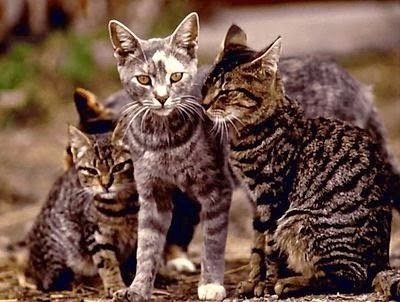
Just the other day I put the signed contract in the mail to Five Star Publishing for publication of my follow-up novel to Rawhide Robinson Rides the Range. This one is titled Rawhide Robinson Rides the Tabby Trail, and recounts our ordinary hero’s quest to rid the mining boomtown of Tombstone of a pestilence of rats. The novel laughs its way from the streets and alleys of Chicago to the Santa Fe Trail to the Mexican border to the O.K. Corral. Like the first Rawhide Robinson novel, this one will be enjoyable for adults and younger readers as well. The book will be released in hardcover shortly after the New Year, I suspect, but just when is yet to be determined. So, there is plenty of time to order copies of Rawhide Robinson Rides the Range for you and all your friends so you will be well acquainted with this ordinary cowboy who does extraordinary things before Rawhide Robinson Rides the Tabby Trail hits the shelves.
Published on July 05, 2014 16:29
June 29, 2014
“Pink” retires from rodeo.

In the early 1970s, Canadian cowboy Bruce (we called him “Pink” back then) Hunt was a roommate and Utah State University Rodeo Teammate. In an uncommon pairing of roper and roughstock rider, we traveled a lot of miles together going to college and PRCA rodeos, ranging as far afield as Colorado and California. He was a hell of a lot better roper than I was a bareback rider, and that’s all I’ll say about that. Bruce later married a cowgirl and settled down in Coalinga, California, as coach of the rodeo team at West Hills College, where his teams won a lot of championships over the years. After more than three decades, Bruce is retiring as rodeo coach. It’s a big loss, and a sad day for the school and the sport.But now that he no longer holds an official position where he is expected to be a shining example to America’s youth, I am free to relate stories about some of the things he got up to when he was young…. On second thought, on the advice of counsel I will, instead, assert my Fifth Amendment right against self-incrimination. And that’s all I’ll say about that.
(The photo: USU Rodeo Team. That’s Bruce “Pink” Hunt, standing second from left. That’s me (they called me “Mini” back then) standing to the left of him in the stylish polka-dot shirt. We both won buckles at that rodeo.)
Published on June 29, 2014 18:38
June 20, 2014
WWA Branding Iron Award.
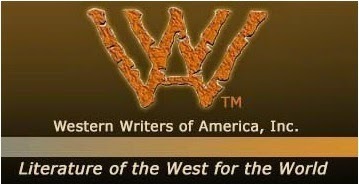
The Branding Iron Award is a special honor bestowed by Western Writers of America “to the member who has provided exceptional support to the organization and its goals.” Among past recipients are Jim Crutchfield, Candy Moulton, and James Ersfeld. While I am in no way fit to be in their company when it comes to service to WWA, the Executive Board, in a weak moment, decided to add my name to the list of Branding Iron Award winners. I am honored and surprised—make that amazed. They made the decision upon accepting my resignation as WWA Membership Chair, a position I had held for the past nine years. As the old saying goes, if I’d known they’d honor me like this for quitting, I’d have done it a long time ago. At the WWA convention next week in Sacramento, I will get a genuine branding iron. If memory serves, it’s about the right size to heat to a cherry red glow and stamp a WWA logo on the side of a beagle pup. But I think it’s meant to hang on the wall, so don’t light a fire or call the dogs.
Published on June 20, 2014 14:20
June 13, 2014
Grand Openings: getting a book off to a good start.
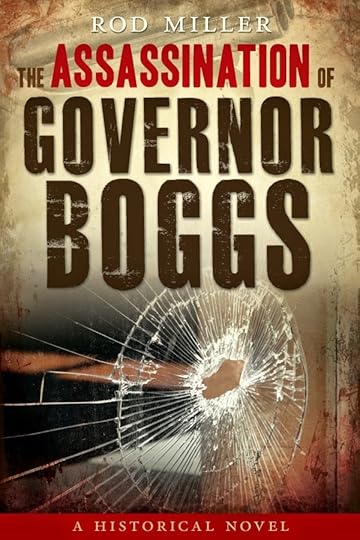
From time to time I am asked to speak at writers’ conferences and workshops. It’s always a good time to congregate with people who like to write (and read) and talk about how to do a better job of stringing letters into words and words into sentences and sentences into paragraphs and so on. Among the many topics I have addressed in these appearances is “Grand Openings: How to get your book off to a good start.” In the presentation, we talk about techniques for writing effective opening lines for books and stories and such. We look at some outstanding opening lines from a variety of fiction and nonfiction books and examine what makes them work. It’s an interesting discussion, and most who have sat through it claim they learned something. Here are a few examples of strong opening lines included in the lecture, some you may recognize and some you may not:
· Call me Ishmael. (Herman Melville, Moby Dick)· It was a bright cold day in April, and the clocks were striking thirteen. (George Orwell, 1984)· We started dying before the snow, and like the snow, we continued to fall. (Louise Erdrich, Tracks)· He was dying faster than usual that morning, striping the sides of the dry sink with bloody sputum and shreds of shattered lung. (Loren Estleman, Bloody Season)· Beware thoughts that come in the night. (William Least Heat Moon, Blue Highways)· By the time Eustace Conway was seven years old, he could throw a knife accurately enough to nail a chipmunk to a tree. (Elizabeth Gilbert, The Last American Man)· This is the most beautiful place on earth. (Edward Abbey, Desert Solitaire)
And, all humility aside, I include the opening line from Chapter One of my novel The Assassination of Governor Boggs, which I think makes for a good start:
· Lilburn Boggs was never the same after getting shot in the head.
There are several techniques employed in good opening lines, but I believe the most important is a carefully measured amount of ambiguity—just enough to engage and involve readers and all but force them to read on to fill the gap.Effective (and affective) opening lines are important, I tell the audience, because if you grab a reader’s interest with the first sentence there’s a chance they’ll move on to the first paragraph, then the first page, the first chapter, and so on. But, if you don’t get them at the beginning, you’ll never get them to the end.
Published on June 13, 2014 07:17
June 6, 2014
Favorite authors.

Reading, while among the most enjoyable of activities, is time consuming. I find myself reading a lot of books for reviews and literary competitions that I wouldn’t otherwise read, so when I read for pleasure, I like to make sure the time is well spent as well as enjoyable. And that means reading books that are more than worth the paper they’re printed on. Even when it’s “escapist” fiction, I still want a book to be well written. Some authors have the ability to deliver every time. Here are a few that I read and re-read regularly:Wallace Stegner. The “Dean of Western Writers” is equally adept at fiction and nonfiction. Big Rock Candy Mountain and Angle of Reposeare excellent novels. Wolf Willow is in a class of its own, blending nonfiction and fiction, including the short story “Genesis,” which may be the best Western short story ever written. All of his books and stories are worth reading. John McPhee. A long-time contributor to The New Yorker, McPhee has several collections of magazine pieces as well book-length treatments of a number of subjects. Some are set in the West, others elsewhere around America and the world. But no matter the subject, I grab up everything I can by McPhee as it is sure to be well written and engaging. Wendell Berry. I read his essays. I read his poetry. I read his short stories. I read his novels. They are all outstanding. It is a wonder how this Kentucky farmer can write so much stuff with a pencil and a yellow pad—let alone write it so well.James Galvin. His poems are often beyond me, but I like reading them. His novel, Fencing the Sky, is outstanding. The Meadow defies description and may well be the best book I have ever read (and re-read, and re-read…). Cormac McCarthy. It seems people either love or hate McCarthy’s writing. Put me in the former category. While it’s unusual and takes a bit of effort, his prose paints pictures so vivid they burn themselves into your brain. And his way of sneaking up on a climactic scene is always surprising. Blood Meridian is haunting and unforgettable, his Border Trilogy (All the Pretty Horses, The Crossing, Cities of the Plain) is outstanding, and I like his other books as well.John Steinbeck. What can I say? His novels made (and make) me love reading. Tortilla Flat, Of Mice and Men, The Red Pony, The Grapes of Wrath, East of Eden…. Steinbeck wrote about a different kind of West and changed people’s minds about what’s out here. There are, of course, many other authors I enjoy. We’ll save them for another day. Meanwhile, who are some of your favorite authors?
Published on June 06, 2014 05:32
May 30, 2014
Seventeen syllables…
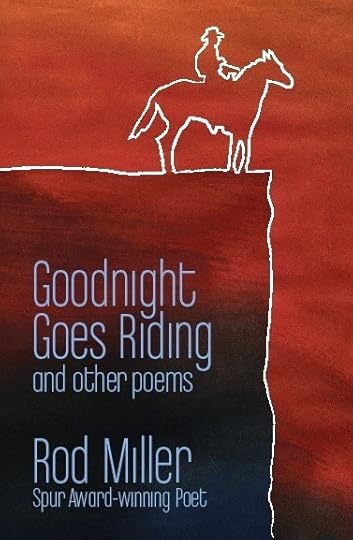
Haiku is a poetic form originated in Japan which has been adapted for use by poets who write in English and harbor a desire to drive themselves crazy. The form requires three lines, the first and last holding five syllables, the middle seven. Seventeen syllables in all. Usually there is an allusion to nature, and a break of some sort that draws attention to a comparison of two images. (See what I mean about driving yourself crazy?)But not always. Poets tend to go their own way, and adapt poetic forms (like haiku) to suit themselves. The fun with haiku, I think, is trying to say something without really coming right out and saying it, and to layer as much meaning into the words as possible. And, for me, ambiguity is often an interesting tool (which can drive readers crazy).Haiku are usually untitled, but I like to use a title of sorts. It can add to the fun. Here’s one I wrote called “Haiku for Hunger”:
Tomorrow lies inthe curve of a woman’s breastin moonshadow glow.
I think it paints a vivid picture, but there’s the question: What’s it all about? Maybe it’s about the hunger of a baby, and the image is of a mother sitting in a rocker by the window in the night, breastfeeding a baby which represents the future.Or it could be the hunger is desire, and the picture it paints is of a man admiring his sleeping wife and contemplating waking her up for some marital bliss to strengthen the future of the relationship (he’s obviously dreaming—or crazy), or hoping to add to the family at some future date nine months hence. Then again, it could be a fretful insomniac woman up all night worrying what the future holds, wishing she’d covered her filmy nighty with a warm robe.Or perhaps it’s something else altogether. But, in the end, it’s only seventeen syllables.“Haiku for Hunger” is one of a handful of haiku verses in my new collection of Western and cowboy poetry, Goodnight Goes Riding and Other Poems. There’s nothing overtly Western or cowboy about the poem, but I like it and wanted it in the book. Besides, it could be the woman in question lives on a ranch. I’ll go with that. The book is due out around July from Pen-L Publishing (www.pen-l.com) . Watch for it. I will be.
Published on May 30, 2014 06:08
May 23, 2014
Book Review-Mustang Spring.
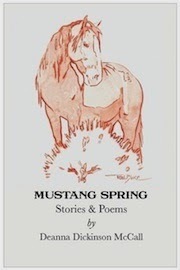
Cattle ranching is bred in the bone of author Deanna Dickinson McCall, having spent her life living and working on isolated ranches around the West, often without modern conveniences. The stories and poems in Mustang Spring do not create or perpetuate the romantic mythology of ranch life; instead, we get unflinching portraits of hardship and hard work, and determined people battling the elements and, sometimes, other people. But the stories and poems are also infused with hope and optimism, qualities inherent in those who struggle to make a living off the land. Written with clarity and creativity, this book makes an outstanding contribution to Western literature.
Published on May 23, 2014 05:50
May 16, 2014
Writing and Riding.
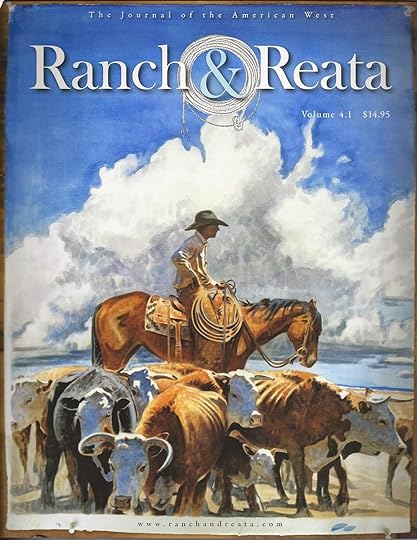
The April-May issue of Ranch & Reatamagazine is 136 pages of photos and stories (and, of course, advertising) of interest to anyone who’s interested in the American West. Included in those pages are two stories I had the opportunity to write.“Thinking Up Stuff” profiles author Johnny D. Boggs. Boggs, in my opinion (and in the opinion of many others), has written some of the finest Western novels on the shelf. He has already won more prestigious awards for his work than any other living Western author, and will, no doubt, win many more. Besides that, he’s a nice guy.Paige Hadlock is the subject of the other story, “Paige Two.” This young horsewoman has won a bunch of championships in cow cutting, including top honors from the National High School Rodeo Association. Then there’s the flip side. She’s not only accomplished on the back of a horse, she shines hanging upside down, wrapped around the neck, leaping from side to side, and all manner of other positions where her fancy tricks take her. She’s been a featured trick rider at a number of shows and rodeos around the West. Learn more about Ranch & Reata at www.ranchandreata.com.
Published on May 16, 2014 14:15
May 9, 2014
26 Letters.

I confess to being something of a Luddite. When I see a technological innovation that will help me do something I already do easier or more efficiently or better, I will grab onto it. But I am not one who grabs every new thing that comes along only to spend a lot of time looking for something to do with it.And so it was with some amusement that I read some time ago about a fancy new “writing tool” for your computer that has so many “powerful” gizmos and gadgets it practically writes books all by itself. Like many things related to computers, the people pushing it (or justifying their use of it) fall all over themselves with praise almost to the same extent they trip the rest of us up with jargon like “feature-rich” and “robust.”Wow. What is it that makes us want to turn a simple job like writing (at least in terms of getting the words down) into something so complicated?Somehow, mankind has managed to write for far longer than we can remember, beginning with scratching characters in clay (a method which still works, should we care to employ it, whereas today’s fancy “writing tools” will likely be obsolete long before you are). Today, with the English language, writing is really nothing more than wrangling the 26 little letters of our alphabet and a few punctuation marks. That’s all. It’s as simple—and difficult—as that.The thing is, paying attention to what those letters say on the page is infinitely more important than how we get them there.I am certainly no expert at writing. But I know, and know about, lots of writers of great accomplishment; some are authors of dozens, scores, even hundreds of books. And few, if any, of them seem to worry much about the process of writing.Instead, they worry about the result.Most seem content with ordinary word processing programs, which, nowadays, means Microsoft Word more often than not. But I have a good friend from up the road, Michael Zimmer, who writes top-notch, intricately plotted novels about Western America using that old swaybacked workhorse, Word Perfect. Paul Zarzyski, a lauded poet, writes his poems on a used, manual, baby-blue portable typewriter he’s used since his college days. Loren Estleman, whose garage is brimming with literary awards for his many mystery and Western novels, likewise writes them all on a manual typewriter. Then there’s Wendell Berry, whose numerous books, from poetry to novels to essays to nonfiction, were and are written in longhand, with a number two pencil, on a yellow notepad.And so on.Twenty-six letters. That’s all it takes. You can either arrange them well, or you can’t. If you can, you’re a writer. If you’re not, all the fancy tools in the world won’t make you one.
Published on May 09, 2014 15:35
May 4, 2014
Writing reality.
The past is messy. Although we like to think the world is black and white, that everything that happens is the result of a direct cause-and-effect relationship, and that only bad people do bad things, history is not that simple. Further complicating our already complicated attempts to understand what happened way back when (or even recently) is the interpretation of events through biased accounts. Records are limited at best, often unreliable, and seldom objective. Then our individual biases enter the picture: the notion that, somehow, the people we choose to cheer for, be they pioneers or cowboys or soldiers or Indians or whoever, were altogether noble and brave and heroic. Our heroes could not possibly do anything nefarious or underhanded, and any unpleasant incidents they found themselves involved in were not their fault. Unfortunately, the real world, then and now, is altogether different. All people—all people—carry with them the capacity to be both good and bad, and most do their share of both. Ignoring this reality results in simplistic, one-sided representations of history in both fact and fiction, from novels with a Roy Rogers view of the Old West to accounts that are purportedly nonfiction but painted with prejudice. Writers and readers are capable of, and deserve, better. As writers, we must set aside our biases and dig deep to understand people and events in the past and give our readers more authentic, realistic stories. In other words, we should tell, and listen to, the truth. To paraphrase a bit of wisdom I heard somewhere, we must be humble in the face of facts. We must accept history as it is, rather than—as we are prone to do—believe what we think happened, or what we hope happened, or, even, what we wish had happened. All this is on my mind just now as I am in the middle of writing a book of history, each chapter of which covers an important, but somewhat obscure, incident in the history of the West. Lost Frontier–Momentous Moments in the Old West You May Not Have Heard Of will be published sometime in 2015 by Two Dot/Globe Pequot. I hope it sheds light on some relatively unknown aspects of history—and does so honestly.
Published on May 04, 2014 06:12



